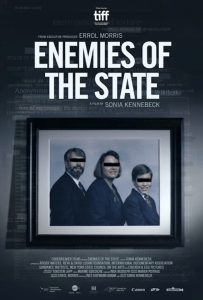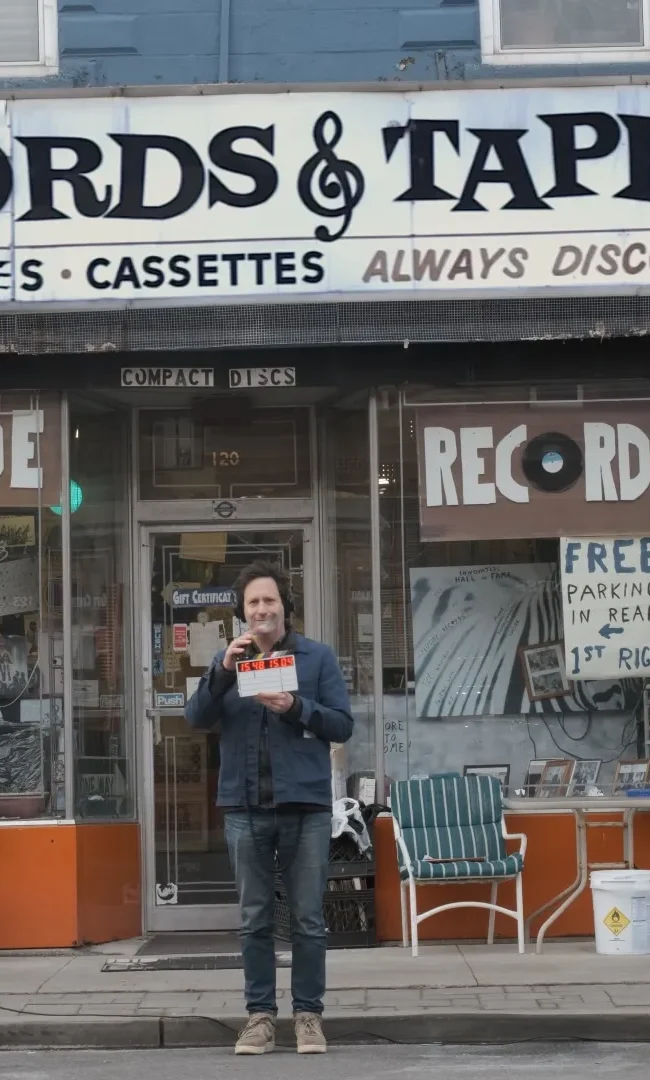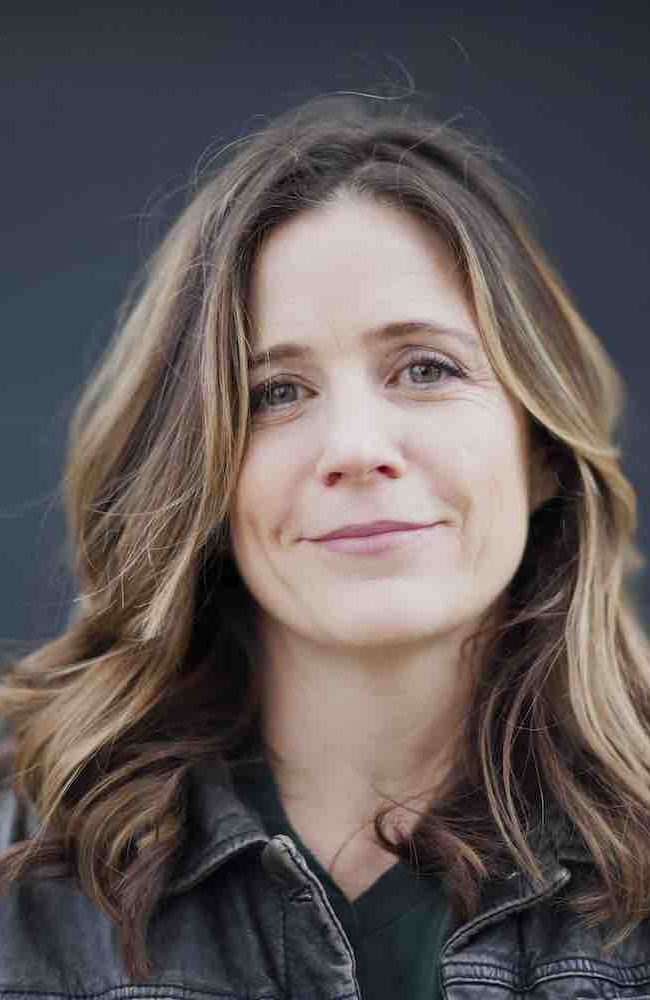A Conversation with Sonia Kennebeck (ENEMIES OF THE STATE)

As I did in 2020, I moderated a number of virtual Q&As for this year’s Annapolis Film Festival. One of them was with director Sonia Kennebeck, to discuss her documentary Enemies of the State (which I also reviewed). The film follows the misadventures of Matt DeHart, accused of inappropriate contact with a minor and of child pornography. He and his parents claim, however, that the United States government is using those charges to discredit him before he can leak classified information related to its abuse of power. He is a hacker, you see, working with both Anonymous and WikiLeaks. Wherever the truth really lies, Kennebeck pursues the story using innovative reenactments combined with interviews and archival footage. Here is a condensed digest of our conversation, edited for length and clarity.
Hammer to Nail: So, here at Annapolis, you have Enemies of the State, but I just watched, last month at SXSW, the premiere of your film United States vs. Reality Winner. Enemies of the State, I believe, premiered at the 2020 Toronto Film Festival. So, you’ve got two films that you’re working on and releasing at the same time. Were you actually shooting them at the same time?
Sonia Kennebeck: Yes, in fact, I was. And it’s been challenging, you know, being the director of two quite different films and kind of navigating the production and also the research of both. All my films are usually quite research-intensive. I like those type of rabbit-hole subject matters. And so, I was reading thousands of pages of documents for both movies. It’s been quite challenging; I’ll admit to that.
HtN: Well, I can only imagine what it was like to be pursuing these two stories in parallel. Both that film and this film deal, at least at first glance, with U.S. government overreach, though this new film has a definite twist. Is that a topic that’s long been of interest to you? Your production company is “Codebreaker Films,” after all.
SK: Yes, absolutely. When you go into the production of an independent feature documentary film, I think you have to be truly interested in the subject matter, because you spend years of your life investigating and really working on one film and one subject, and you go really deep into it. And yes, I studied politics. I’ve always been interested in these types of national-security stories. And so, when I came across the Matt DeHart story, it immediately fascinated me.
I remember when I first heard about it from one of my sources, I spoke to my production partner and I said, “This is really a peculiar story. You know, it involves the FBI and the drugging of a person, and this FBI interrogation.” And we were actually still in the production of my previous film, National Bird, which is about the U.S. drone war, so I was already kind of in a very research-intensive project when I heard about Matt DeHart’s story. And my producing partner, Ines Hofmann Kanna, said, “Oh, we can’t take this type of story on.” You know, at the same time I was just preparing to film in Afghanistan. But it really, it never left my mind, and I really thought about Matt DeHart’s story for a long time, for years. And when National Bird was released, I kind of went back into it, and I started reading court documents and investigating it, and yeah. I thought, “I really want to make this my next film project.”
HtN: Well, you certainly take on some weighty topics, but you do so in a really interesting, innovative way, especially in this movie. How did you land upon the technique of these stylized reenactments, with not just actors, but actors lip-syncing the audio of the actual people? I’ve only ever seen that, so far, in one other film, which incidentally is also playing at the 2021 Annapolis Film Festival, Misha and the Wolves, though your movie does it to a much greater extent. How did you come up with that?
SK: I really have to watch that other film, then! I’m curious how they did it. For us…and I really collaborate with my cinematographer, Torsten Lapp, and my editor, Maxine Goedicke, and also my composer and producer. I’ve been collaborating with my whole team across multiple projects for a really long time. So, early on when I have an idea, I actually go to them first. I ask them, “What do you think about this idea, the story? That’s kind of what I have in mind,” and then we really develop, from the beginning, sort of a visual style and a style of the film which we really think will translate the subject matter in the best possible way. So, a lot of what I do in my films visually, and also in the editing with my collaborators, is intentional.
And so in this case, we came across the real audio of Matt DeHart retelling his very, you know, twisted, complicated story, in his own words. And so we knew we had to use that material, because it is real. It’s such an important source. And because we’re making a film and not a podcast, we really had to think about how to get this across in the most visceral way. And because a lot in the film, sort of in the layers of the film, is about personal memory and people’s perspectives, which is also very contradictory, we thought about recreating these images based on his version of the story; his storytelling, essentially, and his witness and his own testimony.
And so, yeah, I guess we approached it a little bit how you would maybe sort of do lip-syncing in a music video. The actor who we were working with really had to memorize Matt DeHart’s words. We met and we discussed how he would perform it in a hearing, how he was talking. We started with a source, and then from there we tried to develop the images around it.
HtN: He didn’t just have to memorize the words: he had to memorize the cadence, which is very particular. And I thought that everyone did a very fine job. So, how did you cast for this, saying, “We’re going to put you in a documentary reenactment, but we’re not going to hear your own voice, however”?
SK: Well, I cast first by both talent, obviously, but also looks. Because you know, I really…I knew how important it would be not to confuse people, you know, if we had an actor who would look very different. It is, after all, a documentary, but it’s also at the same time a movie, where people have to follow a narrative. And I would say it’s quite a challenging film, so the content of this film is really…there’s so much happening in one story, and you really have to pay attention. There are a lot of layers. And I do think we expect a lot from our audience, as well. You know, this is not the type of film where you can be on your cell phone and be tweeting and so on, because if you miss a piece of information, you might miss something very important, an important twist in the film.
But yeah, we were looking at a lot of different actors, and we had them actually, early on, present some of the lines that are in the film, to see … you know, this is based on a real person, a real story, so to see if we got a match. And what is really important, too, is that the way these scenes come across and are so real also has a lot to do with my editor’s talent. Maxine Goedicke is just such an incredibly talented editor and storyteller, and she, by editing frames over and over again, and going over these scenes so intricately, had a lot to do with how it eventually comes across.
HtN: Well, I agree that your editor and your cinematographer and your composer, all of whom you’ve mentioned, are terrific. You’ve got Torsten Lapp, Maxine Goedicke, and your composer is Insa Rudolph, and you’ve worked with them on most, if not all, of your films, all part of Codebreaker Films, I assume. I notice they’re all German. I assume you have a German background, or else it’s just a coincidence. But how have you formed this team and continued to collaborate with them?

The ENEMIES OF THE STATE poster
SK: Yeah, I was born in Malaysia, but I grew up in Germany. And with the type of work that I do, which is quite high risk … you know, everything, I think, in the national-security space nowadays comes with a risk, especially if you work with original sources. And it is important to me to have a team that I trust, and in particular my producing partner, Ines Hofmann Kanna, she’s an excellent researcher and a journalist, herself. You know, I couldn’t do these type of films without them, to be honest. They are all journalists. They’ve all worked on these type of subject matters before. They all are really, really great researchers.
I feel like people, sometimes they see a film, and especially with this type of documentary, what you see is the tip of an iceberg, you know, in terms of research. Underneath it is this whole sort of other world of research, and hours of material and archival material that really you don’t see in the film. And just to stay accurate and be so careful with the material and with the sources … yeah, I really rely a lot on my collaborators. And I’m really glad that you mentioned them, because film is always teamwork.
And in particular, with our background in Germany…my producing partner, for example, she grew up in East Germany, so the theme of government surveillance is something that we are all so personally interested in, and that we’ve learned about or experienced, ourselves. I think that is also kind of just a very strong motivator for us to stay on these types of subject matters, and not be discouraged when you get interview rejections, and your Freedom of Information Act requests are denied, but instead to really kind of push, because we so strongly believe in government transparency.
HtN: Which is such an important topic. So that’s a rather huge accusation that Matt’s mother, Leann DeHart, levies against the CIA and FBI about the 2001 anthrax attacks, when she finally says what this is ostensibly all about, and it seems like that is going to be the great revelation of your film. But then the way the story evolves somewhat undercuts that, because it turns out that there’s more to the child-pornography accusations than we originally thought. And so, the journey of your film is this roller coaster of revelations. Where do you land on whether there is any actual merit to the government-conspiracy thesis of the DeHarts?
SK: I mean, that’s also where my team comes in, because we’ve been discussing it over and over again. And to be honest, we’re not of one opinion. Each of us has a bit of a different interpretation. That’s what was really important for me in the narrative structure of the film, was that it follows the journey of our own investigation; it felt like this investigation was like an onion, you know, that you unpeel, and you get through these layers of, as you said, a roller-coaster ride.
What you experience as an audience in the film is really very close to what we experienced as journalists and a film team, because we started at one point where we knew about Matt DeHart’s story and the parents’ perspective, and we landed, by the end of our journey, at a very different point. And we heard all these different perspectives, and there were some parts of the story that we couldn’t independently verify. And as you see, there are also very direct contradictions in the story, and what I thought was important is to present all the perspectives that we could find, and really present everything that we investigated, for the audience to reach their own conclusions.
Because I think, at the end of the day, it kind of mirrors our reality the most, because our reality is not always black and white. There are a lot of shades of gray, and there’s a lot of ambiguity. And I know that a lot of people are frustrated by ambiguity or by secrets, but honestly, that’s the way it is, and I’m not going to speculate in my films, or try to tell people what I believe, if I cannot provide all of the evidence. And so I shared what we could find, and a lot of it is actually our real sources and hard evidence. But some of the things…as the reporter Adrian Humphreys says, some of the answers lie with Matt DeHart, and some with the FBI. So we’re actually still following up on some of these. I really present in the film what I could find.
And in terms of the anthrax accusations, I really spent a lot of time investigating that part of the story, and there is evidence still lacking that is crucial, you know? These USB sticks, honestly, we were hoping till the very end; we had some leads of where these USB sticks could be. We’ve been talking to a lot of people in the background, but at the end of the day, we never physically got them. And in the absence of that type of evidence, I really didn’t want to get into the territory of speculations and conspiracy theories, because a part of the film is also how information can spread so quickly over the internet, and we’ve been seeing how damaging baseless conspiracy theories could be, so I caution the audience, but also myself, in just really being careful until you have the evidence and the original sources.
HtN: Very wise approach, I would say, to all things, especially in our conspiracy-fueled era. So, have you shown this film to the DeHarts, and if so, what was their reaction?
SK: As you can imagine, after Matt DeHart did not show up to the interview, that was a very big surprise and kind of a shock to our team, because we’d prepared it so far in advance. We had spoken to his attorney and his attorney was actually ready to take questions from him if he needed legal support. And what might not be obvious in the film is that we actually filmed with Matt DeHart and his family the morning of the interview. So when you see the person walking towards the family’s house, when you see the Scrabble game, that is the real Matt DeHart.
So, everything had been arranged. We traveled out there. We filmed with the family. And then we took a break to set up for the interview so they wouldn’t have to wait, because it takes us quite a while to set up our interviews. And then at the time when the interview was scheduled, I get a call from a suppressed number, and I pick up the phone and it’s Matt, who said, “I can’t do it.” And I was very, very surprised, and I asked why. He said he got advice from an attorney, which was very surprising because we had spoken to his attorney, but it was apparently a different attorney.
We were definitely quite shocked about that development, and obviously we had a lot of questions for him, and I had a lot of questions for him. But after the interview that never happened, we continued speaking to the family. And my production partner, Ines, and I, we have kind of a protocol for preparing our interview partners for a movie’s release. It’s kind of a step-by-step process. We try to discuss what could happen, about film festivals, and then we do a verbal walk-through of the film, and eventually we offer to present the film. You know, without COVID we could have done a safe-environment screening in person.
And I have to say, we did a very detailed walk-through of our film, and Matt’s reaction was actually quite interesting. I do prepare my interview partners along the way that this is a journalistic exploration, and I will investigate in all directions. And I repeated that over the phone, and he said that’s exactly what he expected, and he never expected anything less, and he actually appreciates this journalistic approach. So, that’s what we heard directly from him, that he expected us to do this investigation. And so now that he is out of prison, we have been in touch, but it’s on an irregular basis. We try to check in. But obviously, the family has to, I think, process a lot of information.
HtN: I want to thank you so much, Sonia Kennebeck. It’s been great talking to you.
SK: Thanks!
– Christopher Llewellyn Reed (@ChrisReedFilm)











